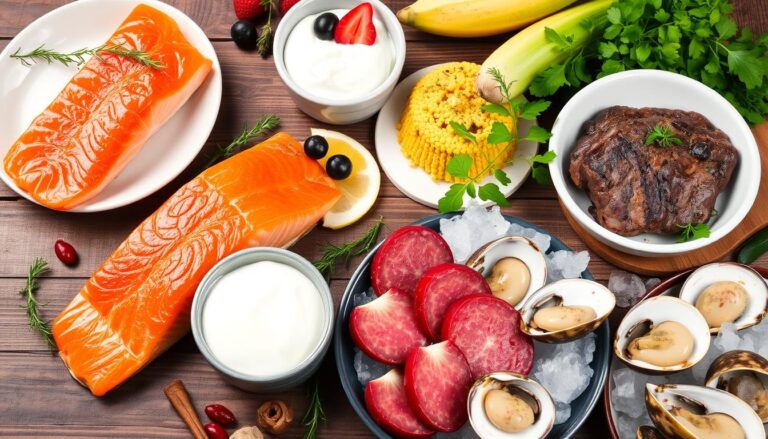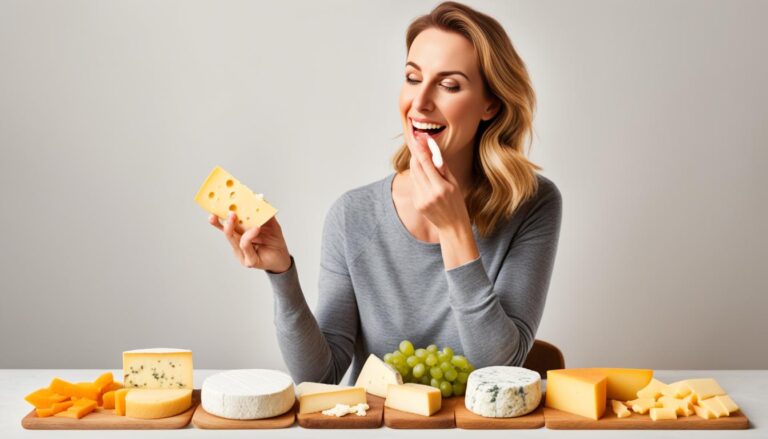Are you ready to start a weight loss journey? This 7-day meal plan is perfect for beginners. It’s made by Accredited Practising Dietitians to help you start healthy.
It’s all about losing weight the right way, without hurting your health.
Key Takeaways
- 7-day meal plan tailored for weight loss beginners
- Approximately 1,200-1,300 calories per day to support healthy weight loss
- Includes a variety of nutritious foods like fruits, vegetables, lean proteins, and whole grains
- Designed to help you develop sustainable healthy eating habits
- Backed by the Australian Guide to Healthy Eating recommendations
Understanding Weight Loss Fundamentals for Beginners
Starting a weight loss journey can be both thrilling and daunting, especially for newbies. To build a strong base for success, it’s key to grasp the basic principles of fat loss. This includes understanding how to create a caloric deficit and the importance of nutrition. Let’s dive into the essential elements that can boost your weight loss motivation and help you reach your goals.
Caloric Deficit Basics
The core of weight loss is making a caloric deficit. This means eating fewer calories than your body uses. Experts suggest a small deficit of 500-750 calories daily. This can lead to a safe weight loss of 1-2 pounds weekly. This slow pace helps you lose fat, not muscle, and keeps the weight off longer.
Role of Nutrition in Weight Loss
Nutrition is key in weight loss. Eating foods rich in nutrients, proteins, and fiber helps you feel full longer. This reduces the urge to eat too much. Adding lean proteins, complex carbs, and healthy fats to your meals can make your diet balanced. This supports your fat loss journey.
Setting Realistic Goals
When aiming for weight loss, setting realistic goals is vital. Going for slow, steady changes is more likely to lead to lasting success. Talk to a healthcare pro or a dietitian to set a healthy goal. Make sure it fits your lifestyle and preferences. The goal is to find a weight loss motivation that’s both reachable and sustainable.

Successful weight loss is not about deprivation it’s about creating a sustainable lifestyle that nourishes your body and supports your overall well-being.
Essential Kitchen Prep and Shopping List
Getting your kitchen ready for weight loss is key. Start by filling your pantry with healthy foods. Make a detailed shopping list with whole grains, lean proteins, fresh fruits, and veggies, and healthy fats.
Some important items to add to your list are:
- Whole grains like oats, brown rice, and quinoa
- Lean proteins such as chicken breast, fish, and eggs
- Greek yogurt for a high-protein, low-fat dairy option
- A variety of fresh produce, including leafy greens, berries, and citrus fruits
- Healthy fats like olive oil, avocado, and nuts
Meal prep can save you time. Try making veggie soup, overnight oats, and pre-cut veggies for snacks. With your kitchen ready and meals planned, you’re on track to reach your weight loss goals.
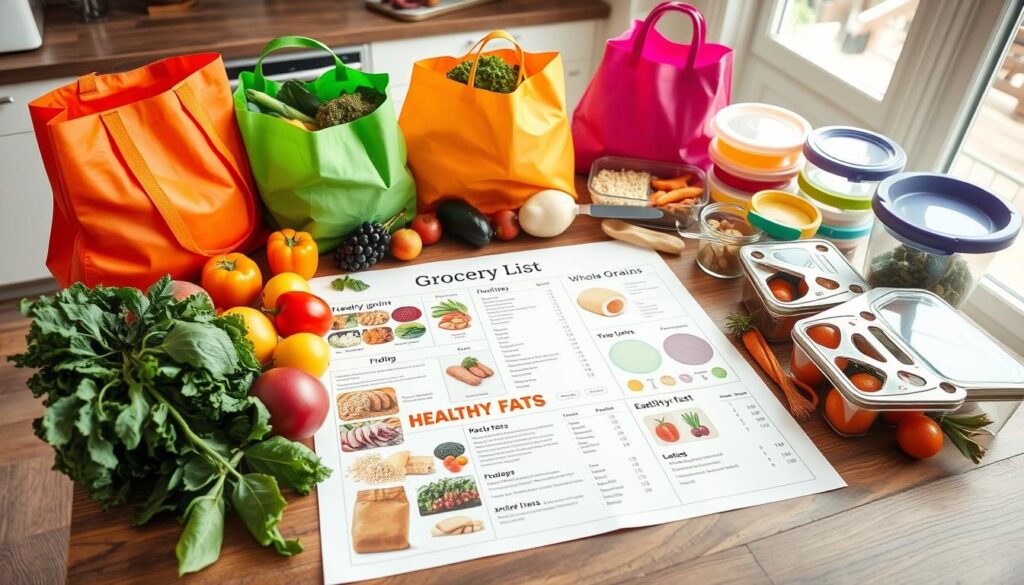
Preparation is the key to success when it comes to weight loss. Having the right ingredients on hand makes it easier to stick to a healthy eating plan.
Remember, everyone’s calorie and macronutrient needs are different. Always talk to a healthcare professional to find the best plan for you.
7 Day Meal Plan for Weight Loss Beginners
Breakfast Options
Start your day with a variety of healthy breakfasts. Try creamy green smoothies with spinach, banana, and almond milk. Or, enjoy hearty overnight oats with berries and chia seeds.
Pair your breakfast with hardboiled eggs or a yogurt parfait. This makes for a balanced and satisfying morning.
Lunch Recipes
Our midday meals are full of flavor and keep you energized. Try salads with grilled chicken or tuna, or savory soups with whole-grain crackers. You can also enjoy sandwiches on whole-wheat bread.
These lunch options mix lean proteins, complex carbs, and fiber. They support your weight loss journey.
Dinner Selections
Our dinner menu offers healthy choices. Enjoy baked salmon with roasted veggies or grilled chicken with quinoa and broccoli. These dishes focus on lean proteins, whole grains, and fresh produce.
They help you stay on track with your weight loss transformation goals.
Healthy Snacks
Snacking is key to a balanced diet. Our plan includes nutrient-dense snacks like crisp veggies with hummus, fruit salads, or mixed nuts. These snacks are satisfying and guilt-free.
They help keep you full and energized all day.
| Meal | Calories | Carbs | Protein | Fat |
|---|---|---|---|---|
| Breakfast | 300-400 | 45-55g | 15-25g | 10-15g |
| Lunch | 400-500 | 40-50g | 25-35g | 15-20g |
| Dinner | 400-500 | 40-50g | 30-40g | 15-20g |
| Snacks | 100-150 | 10-15g | 5-10g | 5-10g |
This meal plan is based on 1,200 calories a day. It aims for healthy weight loss of 1 to 2 pounds weekly. You can adjust for 1,500 or 2,000 calories based on your needs and weight control goals.

Portion Control and Calorie Guidelines
Proper portion control is key for weight loss. This guide gives specific portion sizes for each food group. For example, protein portions are 3-4 ounces per meal, and vegetables are encouraged in larger amounts.
The plan suggests a daily calorie intake of 1,200-1,300 calories. You can adjust this based on your activity level and needs. It’s vital to use measuring tools and learn to estimate portion sizes visually to keep up with your weight loss journey.
Research suggests a daily kilojoule intake of 6,200-6,800kJ. This is for a 20-50 year old woman who is lightly active. It’s based on average energy needs for weight loss.
But, energy needs can change based on age, activity, health, height, and weight. The plan also offers advice for those who are very active and may need more calories than the average.
Following a vegetarian diet can be an effective way to lose weight, as people who follow a vegan diet tend to have a lower body mass index BMI compared to omnivorous diets and pescatarian diets.
A 2017 systematic review found that the best ways to promote weight loss in men include a calorie-restricted diet, physical activity advice, and an activity and behavior-change program.
During menopause, women may gain 1.6 kilograms on average. So, it’s crucial to watch portion sizes and calorie intake to keep a healthy weight loss journey.
Weight loss programs that use face-based language and personal feedback are more appealing. Apps like My Fitness Pal or support from a personal trainer or registered dietitian can help.
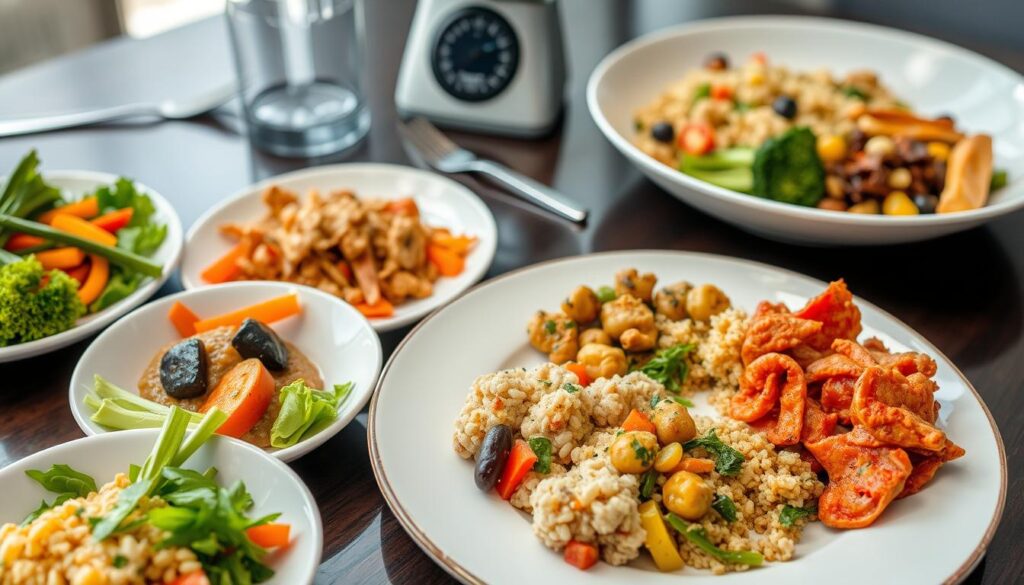
Meal Prep Strategies for Success
Starting a weight loss journey needs dedication, organization, and a good meal plan. Good meal prep can really help you reach your weight loss, healthy lifestyle, and weight loss challenge goals.
Time Saving Tips
One important thing for meal prep is saving time. Use your slow cooker or Instant Pot for easy cooking. This lets you make big batches of soups stews, and braised dishes with little work.
Also, cutting veggies and portioning proteins ahead of time makes assembling meals quicker.
Storage Solutions
Storing your meals right is key to keeping them fresh and tasty. Get good, air-tight containers and reusable bags for your food. This keeps your food fresh, cuts down on waste, and avoids single-use plastics.
Batch Cooking Methods
Batch cooking is a great way to save time and effort. Grill or roast a big batch of veggies, bake several chicken breasts, or cook a big pot of grains like quinoa or brown rice. These can be used in many meals during the week, helping you stay on your weight loss path.
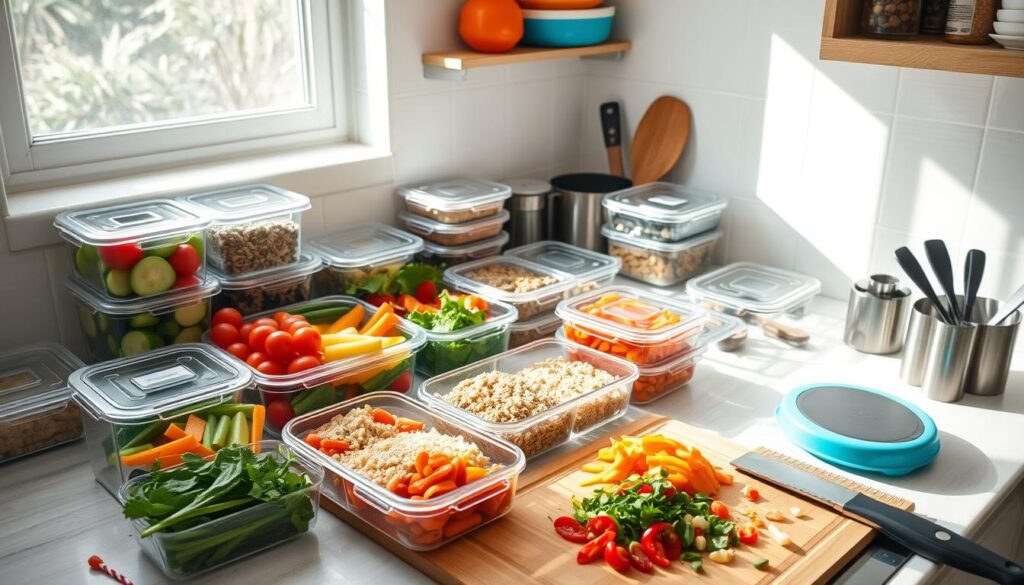
Using these meal prep tips can help you succeed in your weight loss journey. A bit of planning and organization upfront means you can enjoy healthy, tasty meals without the daily prep hassle.
Nutritional Balance and Macronutrients
The 7-day meal plan for weight loss beginners stresses the need for balanced nutrition. It focuses on the right mix of macronutrients. Each meal has lean protein, complex carbs, and healthy fats.
This mix keeps energy levels steady, helps keep muscle while losing weight, and makes you feel full.
The plan aims for about 1,700 calories a day. It suggests eating 45-50% carbs, 25-30% protein, and 25-30% fats. This balance gives the body the nutrients it needs for health and weight loss.
| Macronutrient | Daily Intake | Percentage of Total Calories |
|---|---|---|
| Carbohydrates | 218 grams | 45-50% |
| Protein | 99 grams | 25-30% |
| Fats | 57 grams | 25-30% |
The meal plan also highlights the role of micronutrients. It includes lots of fruits and veggies. This ensures you get enough vitamins and minerals, supporting your health and weight loss goals.
Proper nutrition is the foundation of a successful weight loss journey. By focusing on balanced macronutrients and a variety of nutrient-dense foods, you can achieve sustainable weight loss and improved overall health.
Healthy Substitutions and Modifications
This 7-day meal plan is flexible for different diets and tastes. You can change it to fit your health goals and dietary needs. This way, you keep the weight loss benefits without giving up.
Smart Food Swaps
- Use Greek yogurt instead of sour cream to boost protein and reduce fat
- Choose whole grain bread, brown rice, or quinoa over refined white options
- Opt for lean protein sources like chicken, turkey, or plant-based alternatives like tofu or tempeh
- Substitute full-fat dairy products with low-fat or non-fat versions
- Replace sugary snacks with fresh fruits, vegetables, or unsalted nuts and seeds
Dietary Restrictions Adaptations
For those with special dietary needs, the meal plan can be adjusted:
- Gluten-free: Use gluten-free grains like quinoa, brown rice, or gluten-free breads and pastas.
- Vegetarian/Vegan: Choose plant-based proteins like legumes, tofu, tempeh, or meat alternatives.
- Dairy-free: Use dairy-free milk, cheese, and yogurt made from soy, almond, or oat.
- Nut allergies: Avoid nuts and nut-based products. Instead, use seed-based options or sunflower seed butter.
By making these simple changes, you can enjoy a tasty and healthy meal plan. It supports your weight loss, healthy lifestyle, and weight loss journey goals.
| Original Ingredient | Healthy Substitute | Nutritional Benefits |
|---|---|---|
| White Bread | Whole Wheat Bread | Higher in fiber, protein, and complex carbohydrates |
| Sour Cream | Plain Greek Yogurt | Lower in calories and higher in protein |
| Ground Beef | Lean Ground Turkey | Lower in saturated fat and calories |
| White Rice | Brown Rice | Higher in fiber, vitamins, and minerals |
| Butter | Olive Oil or Avocado Oil | Higher in heart-healthy unsaturated fats |
Tracking Progress and Staying Motivated
Starting a weight loss journey is more than just a meal plan. Keeping motivated and tracking your progress are key to success. Seeing your achievements regularly keeps you inspired and focused on your weight loss goals.
Weekly weigh-ins are a great way to track your progress. They help you see how much weight you’ve lost and spot any challenges. Taking body measurements and progress photos also gives a full view of your weight loss transformation.
Using a food logging feature, like the Fitbit app, can help you keep an eye on calories. It ensures you’re sticking to your meal plan. Remember, it’s okay to have treats sometimes. Focus on the progress you’re making, not being perfect.
Setting non-scale victories, like more energy or clothes that fit better, boosts motivation. These small wins show your hard work is paying off, even if the scale isn’t moving fast.
Motivation is crap. Motivation is easy, and it’s fleeting. Motivation is a bunch of rah-rah bullshit that gets you excited and makes you feel good for a little while. But when it’s gone, you falter.
– David Goggins, author and former Navy SEAL
As you go through your weight loss journey, celebrate every success, no matter how small. By tracking your progress and staying motivated, you’ll reach your weight loss goals and improve your health and well-being.
| Tracking Method | Benefits |
|---|---|
| Weekly Weigh-Ins | Measure weight loss progress |
| Body Measurements | Track changes in body composition |
| Progress Photos | Visually document your weight loss transformation |
| Food Logging | Monitor calorie intake and adherence to meal plan |
| Non-Scale Victories | Celebrate improvements in energy, fitness, and clothing fit |
Conclusion
This 7 day meal plan is a great start for those new to weight loss. It focuses on balanced nutrition and portion control. It also helps you develop sustainable eating habits.
The plan is flexible, fitting your needs and preferences. It uses different diets like plant-based and Mediterranean. It also follows the Dietary Guidelines for Americans.
Weight loss is a journey, not a quick fix. This meal plan includes foods rich in nutrients. You’ll find lean proteins, whole grains, fruits, and veggies.
These foods help you manage your weight and boost your health. Always talk to a healthcare pro or a registered dietitian. They can give you advice tailored to your health needs.
Adding this meal plan to your life is a great first step. It’s a path to a healthier, weight loss journey. Stay motivated, make small changes, and celebrate your successes.


